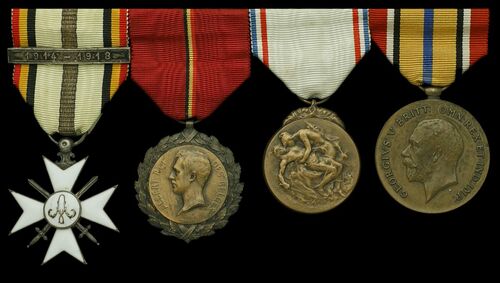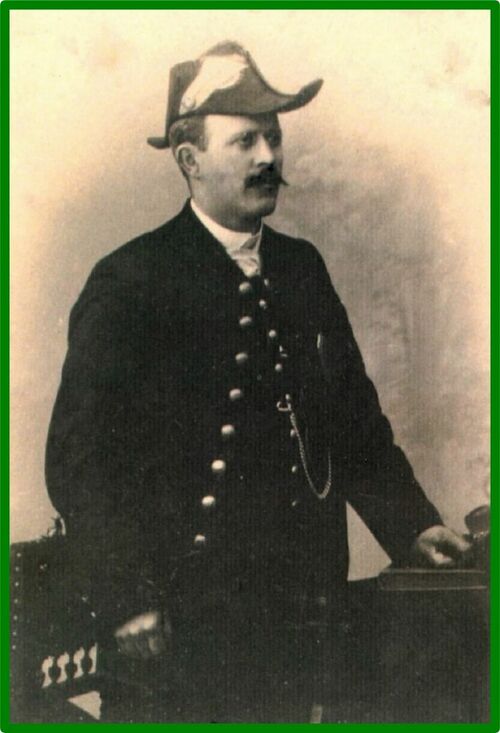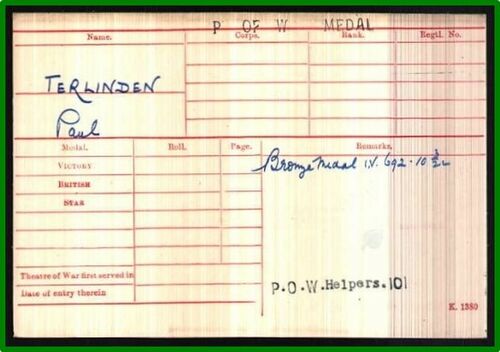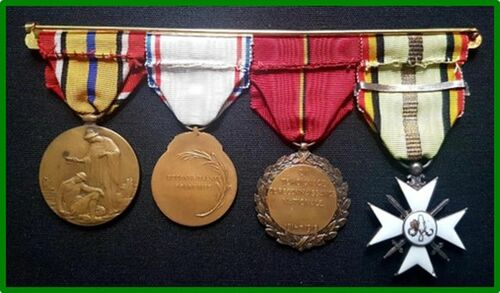Auction: 23003 - Orders, Decorations and Medals
Lot: 101
The interesting Allied Subjects Medal group of four awarded to Baron P. Terlinden, who assisted Prisoners of War during the Great War
Belgium, Kingdom, Civic Decoration Cross 1st Class; King Albert Medal; France, Republic, Medal of Gratitude 3rd Class; Allied Subjects Medal, Bronze, mounted as worn, good very fine (4)
Confirmed as in receipt of 'Bronze Medal' as per 'I.V. 692 10.3.22' on his M.I.C., which also notes 'P.O.W. Medal' and 'P. of W. Helpers'.
Perhaps the best biography of Baron Paul Terlinden is offered in a recently-published article from the Journal of the O.M.R.S.:
'A few years ago I had the good fortune to purchase a mounted group of Belgian awards which included the British Allied Subjects Medal in bronze. This British Medal is found as a standalone medal and the opportunity to research the recipient of such a medal was a welcome challenge. The group was attributed to Baron Paul Francois Marie Joseph Terlinden. Initial research revealed that he was the youngest son of Charles Terlinden, President of the Chamber at the Court of Appeal in Brussels. He was born in Ghent on 4 October 1858 to a family of noble descent, and married Valentine Bosquet (1862-41) on 16 July 1883, at Saint-Gilles, Brussels. He was a Doctor of Law and Municipal Councillor of the town of Rixensart from 1884 to 1921 and Mayor (Bourgmestre) from 1884 to 1917 and from 1918 to 1921 - the missing year is due to his incarceration by the occupying German forces. During the Great War he helped Rixensart with his own finances trying to avoid famine and misery. He was arrested and tried by German Court Martial on the charge of having shielded a wounded French soldier and imprisoned by the occupying Germans in 1917:
'M. Paul Terlinden is sentenced to one year imprisonment in Germany - as Mayor of Rixensart he has resigned his post, protecting his administration from German annoyances (vexations).' Journal d'Union et d'Action Catholique, 28 March 1917.
He was a member of the Chamber of Representatives and President of the Federation of Catholic-Democratic Associations of the District of Nivelles. In addition to his political activities, he was the manager of the estate of the family of Comte de Mérode - he lived at the estate's castle.
In the photo Paul Terlinden is dressed in the uniform of the mayor and alderman - frock coat with hat with white feathers mayor - an alderman's hat would have black feathers. On 8 October 1927 he was honoured by King Albert I with the title of Baron. In 1933 Rixensart named Avenue Paul Terlinden, a street near the station, in his honour. He died at Saint-Gilles on 11 April 1935 aged 76 - buried in Rixensart. He was succeeded to the title by his eldest son Jean.
In April 2014 the local Rixensart periodical Rixensart Info as part of series on the 1914-18 War published an article concerning Paul Terlinden. It noted in the Council Minutes of March 20, 1915:
'...the municipal resources being exhausted, it was his personal money that Mr. Bourgmestre has, since beginning of the war, advanced for everything the Municipality has to pay until March 15, 1915 - charcoal, wood, straw, light, supplied to German troops, grains, flour, etc. and he also paid with his own money amounts owed to third parties, National Food Committee, workers days and general all other expenses. These advances amounted to Francs 28,000, approximately, but by following the subsidies received from the National Food Committee and other revenues are currently being reduced to the figure which will be discussed below. This account closed on March 15 1915, balance in his favour of Francs 18,000". In today's currency this equals an amount of some Euros 100,000. Whilst it was the focus of the Municipal Council to avoid misery and famine Following Terlinden's release from prison in 1918, later that year, he became parliamentarian for the arrondissement of Nivelles and he held the mandate of Catholic MP until the first post-war parliamentary elections in November 1919. On 20 December 1918 he resumed his position as mayor, and the minutes of the Municipal Council of December 20, 1918, note, "The Municipal Council congratulates Mr. Terlinden who resumes his place of Bourgmestre, a position he had to leave by order of the Boches".'
The Terlinden family is an aristocratic Belgian family originally from Rheinberg, north of Düsseldorf in Germany, and which became established in what became Belgium at the end of the 16th century. The eldest of the name bears the title of viscount and the elders of certain younger branches bear the title of baron. Paul's eldest brother Viscount Georges Terlinden, (1851-1947) was Attorney General at the Court of Cassation of Belgium, President of the Superior Council of Hunting and was a recipient of the Grand Cross of the Order of the Crown and the Civic Cross 1st Class. The other brother was Major General Oscar Terlinden (1853-1916) was military tutor to Crown Prince Baudouin of Belgium, and a Knight of Honour to the Queen of the Belgians. There was also a sister, Marie, 1856-1953.
Baron Paul's wife, Valentine, wife served the whole of the war as a nurse with the Belgian Army, serving behind the lines in military hospitals. In April 1918 she was awarded the Queen Elizabeth Medal with red cross - published in L'Independence Belge, 13 April 1918. On April 21, 1919, the Rixensart Municipal Council sent a congratulatory telegram to Madame Terlinden who had returned to Brussels for some leave after more than four years of service, "where she has fulfilled the duties of nurse with admirable dedication, sacrificing hers life and hers family by exposing herself to all the dangers of the front to care for the sick and wounded and in recognition of which his Majesty the King of the Belgians has just decorated her with the Cross of Knight of the Order of Leopold.'
Kenneth Baker's book The Obscure Heroes of Liberty - The Belgian People who Aided Escaped Allied Soldiers During the Great War 1914-18 gives good detail:
Terlinden also had much intimate experience of the war, not all of it good. On the 4th October 1914 his son Robert was killed serving on the German East-Africa front at Kissignies, now Burundi. On many occasions he was involved in confrontations with the Germans. In late 1914 the Germans raided Baron Terlinden's residence at Rixensart and took some property, to which his response was to lodge a complaint with the German Governor of Belgium, Marshal von der Goltz. Von der Goltz in turn invited Terlinden to cast his eyes over a hoard of silver which was about to be sent to Germany and see if he might be able to identify his property. Terlinden said, "None of my plate is here" to which von der Goltz replied "Never mind, if it's not yours, it's someone else's, take your pick". Terlinden scornfully rejected this proposal.
In early 1917 in another incident reported around the world, Paul Terlinden was brought before a German Court Martial on the charge of having shielded a wounded French soldier. The Court handed him a sentence of twelve month's imprisonment. Present also at the trial was Terlinden's daughter, Baroness Marie-Valentine De Coninck, whose husband Jean de Coninck de Mercken, was at the front. A German officer sat beside here and said, "I believe Madame, I have met you before" to which she replied, "You are mistaken, I don't know you sir". The German officer persisted and said, "Perhaps I am mistaken, but you greatly resemble an Englishwoman whom I knew well." The Baroness retorted, "Evidently you mean Miss Cavell". For this, the Baroness was awarded one month in prison."'
Subject to 20% VAT on Buyer’s Premium. For more information please view Terms and Conditions for Buyers.
Sold for
£520
Starting price
£450











